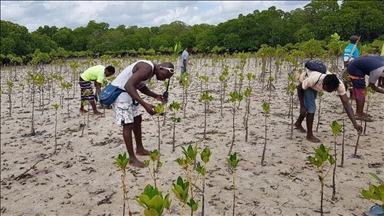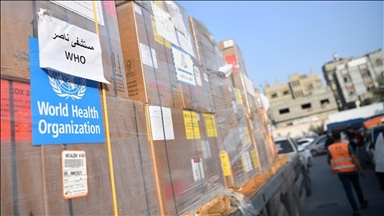‘We are not the enemy’: Tanzania’s herbalists fight for recognition
Herbalists still face discrimination despite being a vital lifeline for many remote communities in Tanzania
 Tanzania ( Stringer - Anadolu Agency )
Tanzania ( Stringer - Anadolu Agency )
- Collaborations with modern health care are on the rise but lingering suspicions and biases need to be addressed
SIKONGE, Tanzania
The scent inside Hawa Nyamizi’s hut is sharp and bitter, with the steamy infusion of neem leaves, crushed aloe vera and earthy-smelling roots bubbling in a blackened pot.
Perched on a three-legged wooden stool, the 58-year-old herbalist leans forward, instructing a frightened mother as she helps her sick son crawl under a heavy blanket, known locally as “kaniki.”
The little boy, barely five, burns with fever and shakes violently, each wheeze rattling his chest. Malaria has hit him hard.
“Close the cloth tightly,” Nyamizi murmurs, as curls of steam waft beneath the blanket into the boy’s face. “He must inhale everything.”
Within minutes, the boy’s shaking begins to ease, and he sweats profusely.
Later, Nyamizi lifts the blanket and gently hands him a cup filled with her brewed herbal concoction. His mother, Salima, cradles him, whispering prayers as she clutches him to her chest.
“It works well – you just have to trust it. Haven’t you asked yourself before all this modern medicine came along: what did our ancestors rely on? Herbs, of course,” Salima says. “Just look at him now, he’s feeling much better.”
Vital healers, but invisible in policy
In this remote Tanzanian village of Mkolye, where the nearest clinic is hours away, locals turn to Nyamizi, who has no formal medical training but holds on to the ancient wisdom of healing herbs and rituals.
While Tanzania is working to provide health insurance for all Tanzanian citizens, modern medicine is still out of the reach of many.
From the misty slopes of the Usambara Mountains to the scattered villages of Mbeya, traditional healers – many unable to read and write – carry on their craft, treating everything from infertility to typhoid.
For many remote communities, these herbalists are a godsend, but although they play vital roles, the official health system barely acknowledges them.
Most traditional healers lack proper licenses, risking arrests, ridicule or rejection. Many are still dismissed as “witchdoctors” – a slur rooted in colonial misrepresentation.
“I heal people with what I know. It’s not magic. It’s knowledge. So, if you call me a witch, that’s an insult,” Nyamizi told Anadolu.
Bridging ancient wisdom and modern medicine
Yet, despite lingering suspicion, some traditional healers are beginning to collaborate with the world of modern science.
Leading the effort is the Institute of Traditional Medicine at Muhimbili University of Health and Allied Sciences (MUHAS), which studies traditional remedies in hopes of turning them into safe, widely available herbal medicine.
With a network of more than 75,000 traditional healers across the country, officials say their contribution to community health is being increasingly recognized.
Back in 2022, Caroline Damiani, acting director of preventive services at the Health Ministry, said “over 60% of Tanzanians get treated by traditional remedies before or after going to our health centers or hospitals.”
A recent study in the East African Health Research Journal found that many healers lack legal protection for their knowledge, making trust between scientists and herbalists fragile. In rural areas, suspicion runs deep, with many fearing exploitation or theft of their knowledge.
“Why should I share my secrets if someone else profits from them?” said Nyamizi.
Meanwhile, the slow and costly process of registering remedies pushes many away from formal systems.
Safety is also a concern, as a study from the Catholic University of Health and Allied Sciences found over 40% of herbal samples were contaminated with bacteria or fungi.
“There’s a real need for proper preparation, preservation and packaging,” said medical researcher Lilian Matiku. “Without it, public health is at risk.”
Despite tension, partnerships are growing
At Bulela village in Tanzania’s northwestern Geita region, traditional healer Lukas Mlolwa has long been a pillar of the community.
His thatched home, surrounded by thorny shrubs and distant hills, is rarely empty. Locals seek his cures for everything from backaches to evil spirits.
“Many people here trust him more than any hospital,” says Rajabu Maulid, a local farmer.
In severe malaria cases, where seizures and anemia strike fast, delays can be fatal. Mlolwa acknowledges that risk, and after receiving MUHAS training on disease prevention, now refers such cases to the clinic.
“I used to do everything alone,” Mlolwa told Anadolu. “Now, when I see danger, I send them to the clinic because I know better.”
But he does not renounce his traditional knowledge, asserting that the two branches of health can “work together.”
At the same time, some herbalists are working with researchers to test their remedies in labs. At MUHAS, scientists are documenting and evaluating herbs, aiming to commercialize the most effective ones.
‘It’s not magic – it’s medicine from the earth’
The government has tried to register healers through national associations, but many remain undocumented, either by choice or due to bureaucracy.
“There’s fear of being arrested,” says Selemani Iddi, chairman of the Traditional Healers’ Organization of Tanzania. “People confuse rituals with crime. Not all of us chant or dance around fires. Many just use herbs. That’s medicine.”
In many villages, herbalists are lumped with soothsayers under the label “babu” or “witch doctor” – regardless of whether their practice is botanical or spiritual. Western media often amplify these stereotypes, casting all healers as shadowy mystics.
“This narrative kills us,” said Iddi. “It erases the science in our work. It denies our humanity.”
In the commercial hub of Dar es Salaam, Jongo Sabe grinds herbs on a woven mat, treating patients from across Africa.
“People think we fly at night or curse children,” the traditional healer told Anadolu. “But I help people with everything from stomach pain to mental confusion. They just don’t see that.”
Sabe insists his knowledge is grounded in centuries of learning.
“I know which roots cleanse blood, which leaves calm the mind,” he said. “It’s not magic – it’s medicine from the earth.”
Despite his popularity, he still faces rejection: “Some neighbors won’t even greet me. They think I’m casting spells. But I’m just a healer, not a witch.”
He blames the fear on ignorance and sensationalism. “Using herbs doesn’t make you dangerous,” he said. “There are bad people in every profession – even hospitals.”
Still, Sabe remains committed to his work, which, he emphasizes, is “a lifeline” for many.
“If someone walks two days to see me, how can I turn them away?” he asks. “My job is to heal, not to scare people.”
One day, he hopes traditional healers will be seen as equals to doctors in white coats.
“We are not the enemy,” he says. “We’re part of the solution. The ancestors taught us for a reason.”
Anadolu Agency website contains only a portion of the news stories offered to subscribers in the AA News Broadcasting System (HAS), and in summarized form. Please contact us for subscription options.



